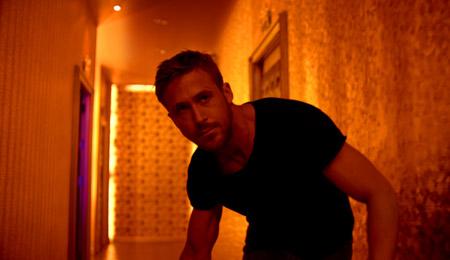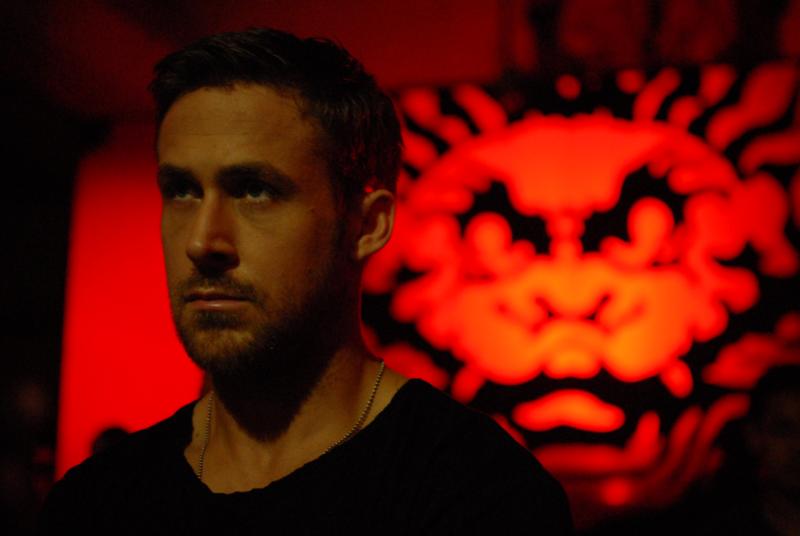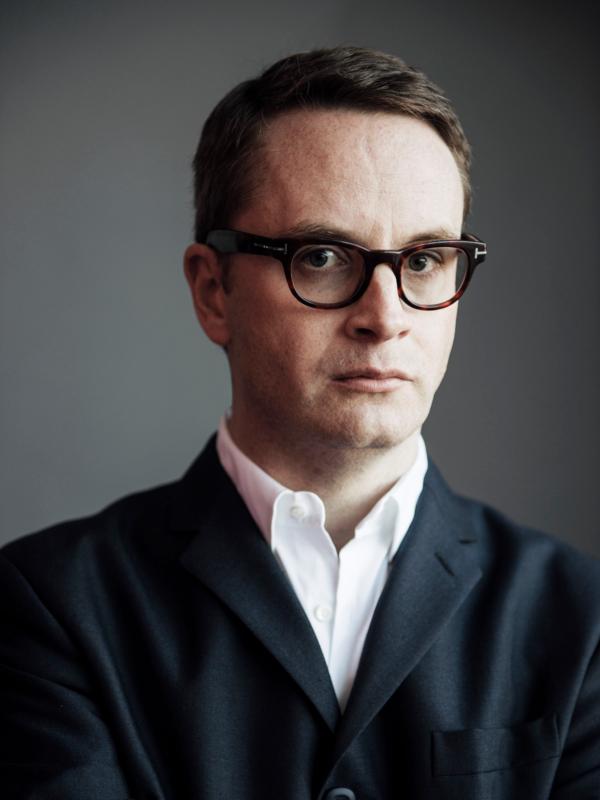By Wendy Mitchell
"I think that I always say that I make feminine movies, I'm a very feminine man. But I seem to always make movies about men." – Nicolas Winding Refn
While Nicolas Winding Refn was living with his family in Bangkok getting ready to shoot "Only God Forgives", his youngest daughter started seeing a ghost. "There was clearly something in her room that communicated and woke her up at night," the writer-director recalls. "We had a lot of discussions back and forth if it was true or not true. But when I told the Thai production manager if she could be helpful in this situation, she accepted it as a matter of fact." A shaman was brought in to sooth the spirit.
It wasn't the ghost itself that stuck with Refn, but the Eastern approach to the unexplainable. "That kind of acceptance of a magical world that is equally as relevant as the so-called real world, that was very interesting and it definitely influenced the film," he says.
In "Only God Forgives", that openness to mystery and mysticism flavours the story of a destructive mother-son relationship that comes to a head in the violent underbelly of Bangkok. Ryan Gosling plays Julian, an emotionally stunted drug smuggler and owner of a Thai boxing club. When his brother (Tom Burke) is murdered, his overbearing American mother (Kristin Scott Thomas) comes to town to push Julian to avenge his brother's death. A corrupt police lieutenant, Chang (Vithaya Pansringarm), becomes the family's nemesis.
Refn says the script changed "immensely" from when he first envisioned the story. "It was coming to Bangkok and being influenced by the city and the Eastern way of life," he adds. "Logic and science are so embedded in Western culture and the film was probably much more conventional in that earlier form."
When he first started formulating a new film with French backers Wild Bunch and Gaumont, he jokes that he "came up with a fight movie, because that was an easy sell." It still is a fight movie – both in the protagonist Julian's boxing gym and throughout the police lieutenant Chang's rampage. But there is more to the film than that.
"The title came to me when the story was in early stage. It came from the idea about doing a movie about a man who believes he's god," Refn says of Chang. "And another man, Julian, searching for a religion to believe in …"
"But also, it's clearly about this mother-son relationship and within that there is this whole list of emotions that we go through, from revenge to hatred to redemption to love."
He continues: "I decided to do it as a heightened reality essentially, as a fairytale. The mother is all evil and the son is under her spell."
Finding His Twin
"Only God Forgives" was a project Refn envisioned even before he made his US production "Drive" in 2010. He says he's glad now that this film got more gestation time. "I think I needed a much longer development period in terms of its script," he says.
"Drive", of course, won him the Best Director prize at Cannes in 2011 and now "Only God Forgives" is back in Competition. People are sure to draw comparisons between the two films, especially with Ryan Gosling playing the lead in both.
Luke Evans had originally signed up to star in "Only God Forgives", but dropped out for other filming commitments. Refn was thrilled to get the chance to work with Ryan Gosling so soon after "Drive".
"Ryan is a very intuitive actor … I don't like to rehearse, I like to see what happens a lot. So we're extremely similar that way. We came up with the analysis that we must have been twins separated at birth."
"One of the great things about Ryan being such a brave actor, he embarks on a character that's all about an internal journey," he adds. "It's about visualising that journey with his behaviour – because once you verbalise the journey, it becomes less mystical. I couldn't imagine anyone else doing it."
The British actress Kristin Scott Thomas plays very much against type as the despicable, crass American mother Crystal – complete with tight clothes, bleached blonde hair, fake nails and stilettos. Refn relished giving her the unusual role. "When I met KST, as I like to call her, we very quickly saw the potential. She said she really wanted to transform herself, and that it would be fun for her to make a film like this, to go all out there. And I was like, 'that's music for my ears.'" He adds with a laugh that she was "very good at switching on the bitch switch."
Kristin Scott Thomas in the unusual role as Julian's bitchy mother. Photo: Space Rocket Nation
Bright Neons and Erotic Reds
Refn had spent time in Bangkok on family holidays and thought it was "an extremely cinematic place."
"Only God Forgives" reunited him with "Bronson" cinematographer Larry Smith. "I wanted the film to feel embedded between heaven and hell. But at the same time to have a feel of authenticity, so it didn't feel fake," he says.
"Knowing that I would want to shoot 360 degrees much of the time, Larry was limited on what he could do and could not do with lighting. We had to be quick and fast in our shooting, and in what we could afford, because we were working on an ambitious seven-week schedule with a lot of locations. Larry is extremely clever in figuring out how we could achieve a lot with very little."
Refn shot in some unconventional locations – like a seedy bar in Chinatown – and avoided having to re-dress locations for more conventional views of Bangkok. "The locations experts were used to crews coming and wanting a more conventional view of Bangkok and expected us doing stuff more on a larger scale. So it took a few rounds of going back and forth to emphasize that I wanted to shoot in these smaller, more authentic places and use them as they were."
Refn insisted on only shooting at night, for more of an "alien planet look." "That's harder and more expensive and slower," he says, somewhat proudly. As is his preference, he shot the film chronologically.
The look of the film – bright neons and erotic reds contrasting with the dark recesses of after-dark Bangkok – are even more impressive considering that Refn is colour blind. "Everything has to be very contrast-y," he says. "I can't verbalise colour most of the times, so when we did the grading Matt Newman, my editor, came in and helped with the grading. He communicates what I'm trying to say. I can't define what the colour palette has to be."
After "Drive", Refn was also keen to work with composer Cliff Martinez again. "Cliff had also spent a lot of time in Thailand, and he was very aware of the musical culture. He introduced me to the Isan sound which became very inspiring for the film," Refn says. "It's from the north of Thailand, and it's a unique Thai folk music." The music is known for its rhythmic vocals and an almost funky percussion.
Adding to the musical offerings are stylized and striking karaoke performances from Chang. "In Asia, karaoke is as normal as brushing your teeth, it's part of the culture," Refn explains. "And the idea is that if he's God then he has to be worshipped. I had this idea that he would sing Thai songs because there is something very nationalistic about that."
As with some of Refn's past works including "Drive" and "Valhalla Rising", the film is light on dialogue. Julian doesn't get much chance to explain himself verbally, but his mother gets some jaw-droppingly offensive lines. "When I had to figure out how evil she could be in terms of her language, I would ask Ryan, 'What's the most degrading thing you could say about a woman in America?'" Refn recalls.
Exploring Manhood
Manhood and its various incarnations of hero and antihero are common themes in Refn's films, starting back from his debut feature "Pusher" in 1996.
"I think that I always say that I make feminine movies, I'm a very feminine man. But I seem to always make movies about men. The character Julian is very much a man who is trapped within his mother's womb, that's his curse," he says. "His journey is to cut the cord in order to be born. The police lieutenant, he represents what Julian needs to awaken from his mother's womb."
In creating this evil, calculating lieutenant, Refn saw similarities to a character such as Mads Mikkelsen's One Eye in "Valhalla Rising" and Gosling's The Driver in "Drive". "You can see the evolution in these three characters, they are very similar, they are all about men who live in a heightened reality. In "Valhalla Rising", he's discovered and given a name and given an identity of One Eye. In "Drive", a similar character is defined by his actions, by being The Driver. In this movie, he has no definition, he's just it. There is a very strong thread between those three characters."
With Refn's versions of manhood, violence always feels like it could erupt at any moment. "Only God Forgives" has its share of gruesome moments, not just your typical bloody beatings (Gosling's face becomes a canvas of pain) but also a hypnotic, almost dance-like scene involving torture with hairpins.
"There was something very sensuous about using the hair pins. It's a very feminine device on one hand but extremely deadly on the other hand."
Refn explains: "With violence, it's like sex. It's all about the build-up, and then if you're expecting to see something, you don't show it. Eroticism and violence is very much the same palette of buttons to push. There has to be a fetish orientation."
Ryan Gosling and Vithaya Pansringarm as Julian and lieutenant Chang. Photo: Space Rocket Nation
Not Playing It Safe
Refn dedicates "Only God Forgives" to Chilean-French director Alejandro Jodorowsky. "Some years ago he baptised me his spiritual son," Refn says with pride. "I think that Jodorowsky always reminds you that if you just make the film the way you want to make it, in the end it will be okay."
Growing up in Denmark in a cinematic household – his mother is cinematographer Vibeke Winding and his father is editor Anders Refn – Refn was inspired by horror films of the '80s as well as Jodorowsky cult classics "El Topo" and "The Holy Mountain". "I always believe the chief enemy of creativity is being safe and in good taste. So Jodorowsky is the man," he says.
Not playing it safe himself, Refn made his own path into the film business growing up in Denmark. He left the prestigious National Film School of Denmark in order to make "Pusher". "When I was younger, I hated any authority and anything that was about the right way or the wrong way or representing good taste. That was the chief enemy, it had to be destroyed. I felt very much outside, but I also wanted to be outside," he recalls.
Refn had success with "Pusher" but was humbled with his second film "Bleeder" in 1999 and especially 2003′s "Fear X", which bankrupted him (as seen in Phie Ambo's documentary "Gambler"). During that time, he remembers going to work in the UK on the "Miss Marple" TV series, something he says that then "felt like a low point, but looking back it's the best thing that happened to me."
"I got success very young and I thought I could walk on water. When I realised I could also drown very fast, reality kicked in," he recalls.
"Having to claw my way back, pay my million dollar debt to the bank because of a personal guarantee, it was pretty depressing times, but looking back on it, it was the only thing that could happen. I needed to crash when I was younger because I needed to rebuild again before I turned 100. The most important thing in anything in art is figuring out what didn't work and making that into your strength the next time."
Throughout his ups and downs, he's thankful for the enormous support from the Danish industry, and indeed "Only God Forgives" is produced by his local production company Space Rocket Nation, established with his long-time producer Lene Børglum. He says even with Gaumont and Wild Bunch's support, there is no way the film could have been made without financing from the Danish Film Institute.
"Here in Denmark we have the best support system in the world," he notes. "Working in LA or in England, you see how lucky we are. And how much support we have, and freedom, and everything that comes with that."
He is, however, not sure if he will ever make another film in the Danish language. "The films I make are very much easier to finance if I do them in English. English just provides a larger distribution net. But it also depends on what kind of films you make. Never say never …"
Barbarella and Beyond
Refn is now working on several new projects, including the second planned film with Gaumont and Wild Bunch, a Los Angeles-set thriller called "I Walk With The Dead", which he is now writing and hopes to shoot in early 2014.
He is also planning an English-language TV series based on Barbarella to shoot at the end of 2013 or early 2014. "Sci-fi television is a very undiscovered medium at the moment," he enthuses.
And he will produce a US remake of "Maniac Cop" (the 1998 film by his friend William Lustig), which could be developed into a new franchise. Graphic novelist Ed Brubaker will write the script and no director is attached yet.
After abandoning plans to reteam on a remake of "Logan's Run", he and Gosling still want to keep working together. "We want to do a comedy together next," Refn reveals. "We're trying to find it. It's going to come from the heavens very quickly."
"Only God Forgives", selected for Cannes Competition, is produced by Lene Børglum for Space Rocket Nation.
Read interview with producer Lene Børglum: "We Pushed Ourselves to the Max".
Trailer




